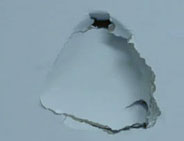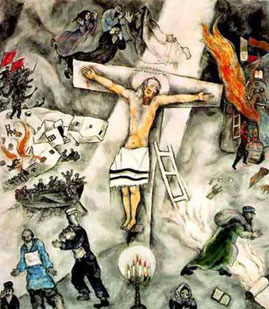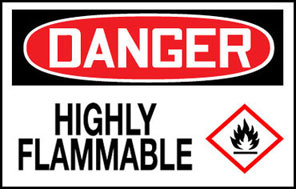
Reflection
by Deborah Beach Giordano
September 2, 2019
The Discovery
One day, while sitting with a young couple in the cool, pristine hospital space reserved for those awaiting the outcome of a loved-one’s surgery, we decided to rearrange the furniture. It was an odd layout that could only be improved upon. Besides, it gave us something to do.
A highback sofa and matching chair had been wedged together at the far end of the room, several folding chairs were stacked in a corner, a low table covered with the requisite National Geographic and Car and Driver magazines sat, alone and inaccessible, under a window. We knew we could do better.
 When we pulled the sofa out from its cramped corner, we made a curious discovery: a large hole in the wall, five or six inches in diameter, about four feet from the floor; less a hole, perhaps, than a deep indentation. The plaster around it was cracked and crazed, most of the paint was still intact. As we gazed in surprise at the damage, Sean said, “Somebody put his fist through there.” Impulsively, unthinkingly, I said, “Gosh, I hope he’s all right.”
When we pulled the sofa out from its cramped corner, we made a curious discovery: a large hole in the wall, five or six inches in diameter, about four feet from the floor; less a hole, perhaps, than a deep indentation. The plaster around it was cracked and crazed, most of the paint was still intact. As we gazed in surprise at the damage, Sean said, “Somebody put his fist through there.” Impulsively, unthinkingly, I said, “Gosh, I hope he’s all right.”
It was a ridiculous thing to say. Obviously that person wasn’t all right; whether or not his hand was injured, he had clearly been wounded — cut to the heart, we might say — by what he had been told in that room. The surgeon’s report, medical findings that boded only evil; here was an outward sign of an inward suffering: an outpouring of pain too terrible to bear.
Fortunately in our case, Rachel’s mother’s surgery was a success, and she made a full recovery. But the image of that broken wall has stayed with me ever since. It was a testimony to the reality of agony and outrage and grief — of suffering beyond words. It spoke a kind of truth that we’re ordinarily too polite to mention.
It was a scream to heaven of the sort we’re ordinarily too nice to pray.
Respect or Blasphemy?
Somehow, somewhere along the way, we’ve confused respect for God with a mandate to protect God from the reality of our lives. We hem and haw and hint at what we truly want: we speak of our sorrows — gently; we ask for strength — calmly; we pray softly, gently, politely: whispered wishes, passionless, denatured desires.
I wonder if that attitude constitutes God abuse — a kind of blasphemy: treating the Eternal as some sort of fragile, sensitive plant, too weak to withstand a solid dose of reality; or too erratic and unpredictable to be trusted with our authentic emotions. Surely God is tougher than that. Surely the All Compassionate One can be relied upon to love us, regardless — and never to harm us.
 As Christians, we proclaim that, in the person of Jesus of Nazareth, the Eternal experienced our full humanity: joys and sorrows, ease and hardship, wine and cheese, love and loss, birth and death. All that we know, He knew. In Him earthly and divine wisdom and compassion were transferred both ways.
As Christians, we proclaim that, in the person of Jesus of Nazareth, the Eternal experienced our full humanity: joys and sorrows, ease and hardship, wine and cheese, love and loss, birth and death. All that we know, He knew. In Him earthly and divine wisdom and compassion were transferred both ways.
Our God is an understanding God, One who knows what delights us, as well as what incites us to rage against the Light when it seems to fail, One who understands the hurt and hopelessness that drives us to doubt and deny God. In the agony of His suffering and death on the cross, Jesus Himself cried out in desperation, “My God, My God! Why have You forsaken me?”
And Easter happened.
That is the Beloved’s response to the experience of being human — the trauma of birth, the challenges of life, the terror of death. God answers our hopes and our prayers, our fears and our tears with a radiant transformation: all is renewed, redeemed.
The Resurrection is the Almighty’s public pronouncement and proclamation of ultimate authority and unlimited grace. God’s Word is the last word. And that word is Life.
We have no cause to be afraid.
A Sacred Offering
This is not to suggest that we routinely shriek and shout at God; only that we honor the Radiant One with our honesty. Faith is trusting in the Beloved’s grace and goodness: fearlessly, truthfully telling our experience of being human.
We cannot hide the truth from the Eternal; such efforts only deceive and harm ourselves. Honest prayer is central to faith. Admitting what we are feeling, what we yearn for, hope for, dream of — including speaking openly of those things we fear and hate, is to bring them forth as offerings.
The offerings pleasing to God are a humble spirit;
a broken and a contrite heart, O God, You will not despise.
~ Psalm 51:17
Honest prayer is a sacrament: lifting up to the Lord God our life as it really is; unvarnished, undisguised. In honest prayer we bring ourselves to the altar for blessing and transformation. Only an open heart can be healed.
God’s Response
 I’ve often imagined taking that broken section of the hospital wall and laying it on the altar: a profoundly human offering beneath the shadow of the Cross — which is itself a witness to human suffering and a testimony to God’s extraordinary response.
I’ve often imagined taking that broken section of the hospital wall and laying it on the altar: a profoundly human offering beneath the shadow of the Cross — which is itself a witness to human suffering and a testimony to God’s extraordinary response.
Our cries are not unheard or ignored. God’s response to our pain is not avoidance, but participation: the incomprehensible decision — made from absolute love — that One who could avoid suffering instead chose to experience it, to take it on Godself; to be with us utterly and completely.
What we know, Christ Jesus knew; what we experience, He experienced. We are understood and, in some extraordinary way, our pain and suffering is carried by the Lord.
A Safe Space
Our shouts to heaven — whether as anguished prayers or cries of anger, frustration, or despair are heard and held within the heart of God. And that is the best place for them: a sanctuary, a containment area where they cannot hurt us or do harm to others.

The burden of these “unspeakable” emotions weighs down our spirits, leaving us helpless and unable to be present and useful in difficult times. They become the focus of our energy, the driving force of our thinking and our beliefs. We become that — that emotion or attitude begins to define our character, revealing itself in what we say and how we act. And then things really start to break apart. Beyond shattered walls there can be equally shattered lives as the pressure of unexpressed anger or resentment, fear or grief can can suddenly explode in senseless outbursts of violence or vitriol or ultimate despair.
Give to God what is God’s.
Only honesty can save us. When we truthfully offer all that we are to the Compassionate One, we can be transformed. Our trials and troubles may not be perfectly mended, situations may not be changed to our satisfaction, our sufferings and sorrows may not be relieved — but they will be illuminated by the Light of grace.
When we prayerfully, honestly, unburden ourselves from the weight of our “secrets,” these fierce emotions and impulses become offerings upon God’s holy altar; fragments of our wounded humanness sheltering in the shadow of the Cross. There we rest in the Gospel Promise: the Eternal is compassionate and understanding, we are loved and cherished beyond all knowing.
Let all that lives, praise the Lord. (And shout and yell, as needed!)
May Christ’s grace and healing love abide — and abound,
Deborah ✝
Suggested Spiritual Exercise
Pray honestly.